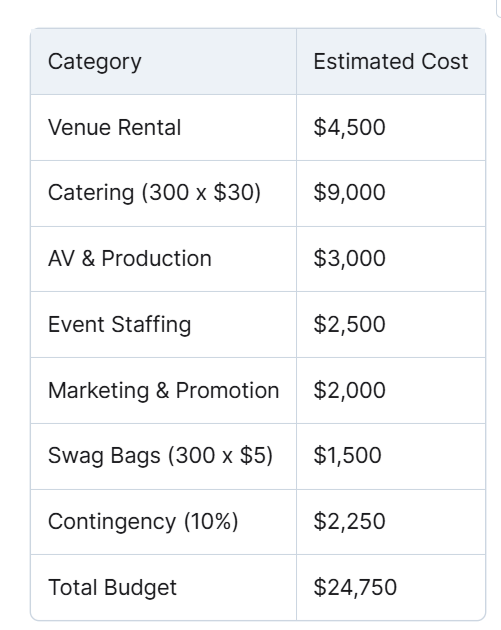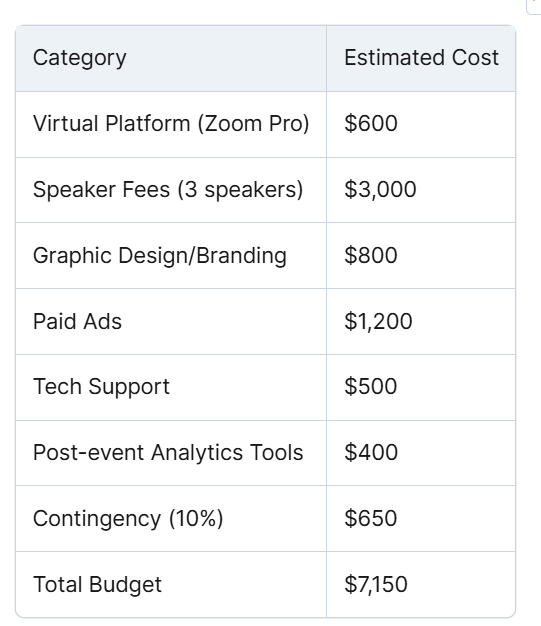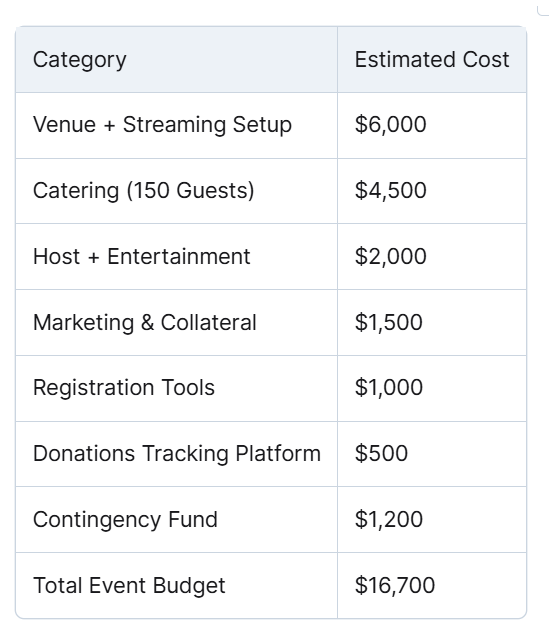Essential Guide for Event Budgeting: Tips and Tools for Success in 2025
Master the art of budgeting for events with practical tips and essential tools. Enhance your planning skills—read the guide now for success!

Introduction: Why Budgeting is the Backbone of a Successful Event
Planning an event without a well-structured budget is like building a house without a blueprint. Whether you're organizing a corporate event, hybrid conference, or in-person product launch, budgeting for events is essential for success. It ensures that all your resources are allocated effectively, your spending remains under control, and your event delivers both impact and ROI.
It should provide a clear financial roadmap that guides you from the early planning stages through to post-event analysis. It enables event planners and organizers to estimate costs, prepare for unexpected expenses, and make strategic decisions that contribute to the event’s success.
In this comprehensive guide, we’ll walk you through a step-by-step approach to creating an event budget, share real examples, offer free downloadable templates, and introduce powerful tools like Azavista’s event management software that can transform your budgeting process.

What is an Event Budget?
An event budget is a detailed estimate of all the costs associated with planning and executing an event. It outlines projected expenses, identifies key revenue sources (like sponsorships or ticket sales), and helps event planners monitor actual spend throughout the event lifecycle.
Think of it as your event’s financial control panel. Without it, your team may overspend, overlook important categories (like AV equipment or venue rentals), or fail to allocate funds for a contingency fund—a common mistake, especially in the case of unforeseen expenses.
Key Terms Which We Will Use:
- Event budget template: A ready-made format to help planners input and calculate all cost categories
- Fixed and variable costs: Essential for understanding what expenses stay constant versus those that fluctuate
- Event budget sheet: Typically used in Excel or Google Sheets to manage budget calculations and track actuals
- Event budget format: The structure in which your costs and revenues are presented, such as line-by-line breakdowns by category
Pro Tip: Use tools like platform to sync your budgeting with your event planning timeline, helping teams collaborate and track expenses in real time.
Why Budgeting is Critical for Event Planners
Budgeting for events is not just about saving money, it's about making the most of your resources to deliver an exceptional attendee experience. It empowers , avoid budget constraints, and adapt to changes without compromising on quality.
Whether you’re organizing small internal workshops or large-scale conferences, a detailed event budget helps you:
- Stay within a total budget cap
- Break down and understand event costs
- Prepare for both fixed and variable expenses
- Track and adjust actual expenses vs. projections
- Justify decisions to stakeholders using concrete data
Let's start with Key Expense Categories while creating event budget:
- Venue rental
- Staff and vendors
- Catering and logistics
- Technology (virtual platforms, A/V)
- Marketing and promotions
- Post-event reporting and analytics
By leveraging professional tools such as Azavista’s software, event planners can not only estimate costs accurately but also automate budget tracking across departments—making it easier to adapt as new event expenses arise.
Step-by-Step Guide to Creating an Event Budget:
Creating a comprehensive event budget doesn’t have to be overwhelming. Follow this structured, step-by-step guide to stay organized, financially focused, and aligned with your event goals—while learning to effectively manage event expenses.
Step 1: Define Your Event’s Goals and Scope
Before adding any numbers, get clear on:
- Event type: in-person, virtual, or hybrid event
Each format brings different financial aspects—from venue costs to event technology requirements. - Target audience size
impacts your event cost breakdown, including catering, seating, and how many staff members you’ll need. - Duration and number of sessions
More sessions may require higher spend on speakers, tech, and staffing over time. - Success metrics: ticket sales, attendee satisfaction, brand exposure, etc.
Setting metrics helps align budget decisions with your event marketing and ROI goals.
Why this matters: Your event scope directly impacts budget size, logistics, and the resources needed for financial success.
Step 2: Identify Revenue Sources
Budgeting isn’t just about expenses—it’s about funding too. Estimate income from:
- Ticket sales
Base projections on conservative numbers to avoid overestimating event finances. - Sponsorship packages
A major contributor in the event industry, especially for large or recurring events. - Exhibitor fees
Key for trade shows or expos, and helps offset operational costs. - Donations or grants (for nonprofit events)
Essential for nonprofit event organizers to stay financially sustainable. - Merchandising or add-ons
Can be a strategic revenue stream during or after the event concludes.
Tip: Always use past performance data to guide future revenue projections for budget planning.

Step 3: List and Categorize Expenses
Start categorizing all known and expected costs. This makes it easier to create an event budget step or import into your event plan template.
Common Categories:
- Venue rental : Often one of the largest fixed costs for in-person event; important for both indoor and outdoor upcoming events.
- Audio/visual & tech setup : Critical for engaging audiences, especially at virtual or hybrid events using modern event technology.
- Catering and food services : Scale this based on your attendee count and type of meal service.
- Marketing and advertising : Allocate funds to attract your audience and support overall event marketing strategies.
- Speakers & entertainment : These costs vary by reputation, travel needs, and technical requirements.
- Staffing & volunteers : Include wages, training, and any volunteer appreciation efforts.
- Swag, gifts, or giveaways : Add value for attendees while promoting your brand. Like for attendee differentiation.
- Travel & accommodation : Especially relevant for speakers, VIPs, or destination events.
- Contingency fund (recommended: 10–15% of the total budget)
Helps protect against unexpected costs without derailing your event.
Step 4: Estimate Costs (Based on Research or Past Events)
For each item, estimate projected spend. This is where your event cost breakdown becomes more accurate.
- Vendor quotes: Crucial for price comparison and helps you effectively manage your budget.
- Past event budgets: Great for reference—use past spend to refine estimates for future events.
- Online pricing calculators: Useful for building estimates quickly, especially when customizing your event plan template.
Also consider:
- Fixed costs (e.g., venue booking): These don't vary with attendance but form the base of your budget planning.
- Variable costs (e.g., meals per attendee): Adjust based on registration numbers to avoid overspending and ensure financial flexibility.
Step 5: Track Actual vs. Projected Costs
As the event approaches, start tracking real expenses.
- A real-time event planning budget spreadsheet : Helps monitor overspending and stay aligned with your financial goals.
- Tools like Azavista’s budget tracking module : Useful for managing multi-line budgets across teams or departments.
Tip: Tracking actual vs. estimated costs improves forecasting for future events and overall event finances.
Step 6: Build a Contingency Fund
Event planners should separate emergency expenses to anticipate errors and unexpected costs during the event. Unexpected costs are part of event planning—be ready.
Set aside 10–15% for:
- Last-minute rentals: For example, Equipment failures or space needs may arise.
- Unplanned logistics : Include transport delays, weather issues, or tech fixes.
- Extra materials or staffing : Critical when actual attendance is higher than expected or staff no-shows occur.
This buffer is essential for financial success and smooth operations until the event concludes.

Step 7: Use Templates and Tools
Don’t build your budget from scratch—save time and stay accurate.
- Event budget template in Excel: A popular option for manual tracking and custom fields.
- Custom templates for corporate or hybrid events: Tailored tools can streamline workflows and help event organizers stay focused on goals.
We’ll link some free event budget templates later in this post! Attaching a free template for you to use.
5. Event Expenses: Key Categories and Cost Breakdown
Understanding each category of event expenses helps you plan better and avoid last-minute overspending. Here’s how you can break it down:
Venue Costs
If you are hosting in person events, then this becomes a big expense. Following are the things you need to focus on:
- Rental fee
- Security deposit
- Insurance
- Cleaning and overtime charges
Audio/Visual & Tech
- Screens, projectors, microphones
- Live streaming tools for hybrid events
- WiFi and IT support
Food & Beverage
- Plated meals vs. buffet
- Beverage packages
- Dietary accommodations
Marketing & Promotion
- Social media ads
- Email campaigns
- Paid media placements
Staffing
- Temporary hires
- Security
- Onsite management
Speaker & Entertainment Fees
- Travel and accommodation
- Talent fees
- Technical riders
Swag & Decor
- Branded giveaways
- Floral, lighting, banners
Miscellaneous & Contingency Event Costs
- Emergency purchases
- Weather-related changes
- Unforeseen third-party charges
Use your event budget template to input estimates under each of these. Break it down line by line for clarity and accountability.

6. Event Budget Templates You Can Use
Using a pre-built event budget template saves time, increases accuracy, and ensures you don’t miss critical cost categories. Whether you’re a first-time planner or managing complex corporate events, templates help you stay on track.
Popular Template Formats:
- Event budget template Excel
Ideal for detailed line-item tracking, formulas, and automatic totals. - Event budget template Google Sheets
Great for real-time collaboration with team members and vendors. - Event planning budget spreadsheet (PDF or printable)
Perfect for offline planning or client presentations.
What to Include in Your Template:
- Event name, date, and type (virtual, hybrid, or in-person)
- Estimated vs. actual costs
- Vendor details & payment schedules
- Revenue sources (ticket sales, sponsorship)
- Notes section (for approvals, deadlines, or justifications)
7. Real Examples of Budgeting for Events (With Cost Breakdowns)
Seeing examples of budgets for events in action makes it easier to structure your own. Here are three sample scenarios:
A. Corporate Networking Event (In-Person, 300 Attendees)

B. Virtual Conference Event Budget Example (1-Day, 500 Registrants)

C. Fundraising Gala (Nonprofit Hybrid Event)

Analysis:
- Always include a contingency fund
- Estimate costs conservatively
- Use actual spend post-event for future planning
- Review past events to avoid repeating mistakes
Pro Tip: Compare multiple event budget examples to identify patterns, overspending trends, or smart cost-saving hacks.
8. Tips for Budgeting Effectively for a Successful Event
An event’s financial performance can make or break its overall success. Follow these expert budgeting tips to maximize impact, reduce stress, and ensure your event budget proposal gets approved and executed effectively.
Top Budgeting Tips for Events:
1. Start Early & Update Often
- Begin building your budget in tandem with your event planning process.
- Update your event budget sheet regularly as quotes and costs come in.
2. Use Tiered Even
- Break down into “must-haves,” “nice-to-haves,” and “extras.”
- This helps you allocate resources effectively and manage budget constraints.
3. Fixed vs. Variable Financial Control
- Fixed costs: venue, speaker fees, licenses
- Variable costs: food per attendee, printing, travel
Tip: Keep your event planning budget spreadsheet structured so you can see how changes affect your total instantly.
4. Create Multiple Budget Scenarios
- Build best-case, realistic, and worst-case budget formats for an event.
- Prepare for unexpected expenses by building buffer lines in each category.
5. Track Actual Spend in Real Time
- Compare actual costs vs. projected for all line items.
6. Use Data From Past Events
- Revisit past events to analyze where you over- or under-spent.
- Use that info to better estimate costs and build smarter future budgets.
7. Communicate With Stakeholders
- Align everyone on financial expectations.
- Present a clear event budget proposal using visuals or a clean event budget format.
8. Review and Optimize After the Event
- Perform a post-event analysis to measure ROI, budget accuracy, and vendor performance.
- This is key for improving your next event budget example.
9. Final Thoughts: Event Budgeting Is the Foundation of Event Success
A well-crafted event budget is not just a financial document—it’s a strategic tool that influences every stage of your event planning process. Whether you're organizing a small in-person seminar or a multi-day hybrid conference, budgeting for events helps you:
- Set realistic goals
- Avoid unexpected expenses
- Ensure a higher ROI
- Measure the event's success accurately
By following best practices, using helpful event budget templates, and leveraging technology like Azavista’s event management platform, you can transform budgeting from a stress point into a powerful planning advantage.
Remember: the best event planners don’t just track costs—they forecast, optimize, and learn from every event.
Free Download: Event Budget Templates for Every Type of Event
Want to hit the ground running with your next event?
Download our free, customizable event budget templates, designed for:
- Corporate events
- Fundraisers
- Product launches
- Hybrid and virtual events
- Conferences & exhibitions
Formats include:
- Event budget template Excel
- Event budget template Google Sheets
- Event planning budget spreadsheet
These templates include built-in formulas, pre-filled cost categories, and space to track actual costs, projected expenses, and revenue sources.












